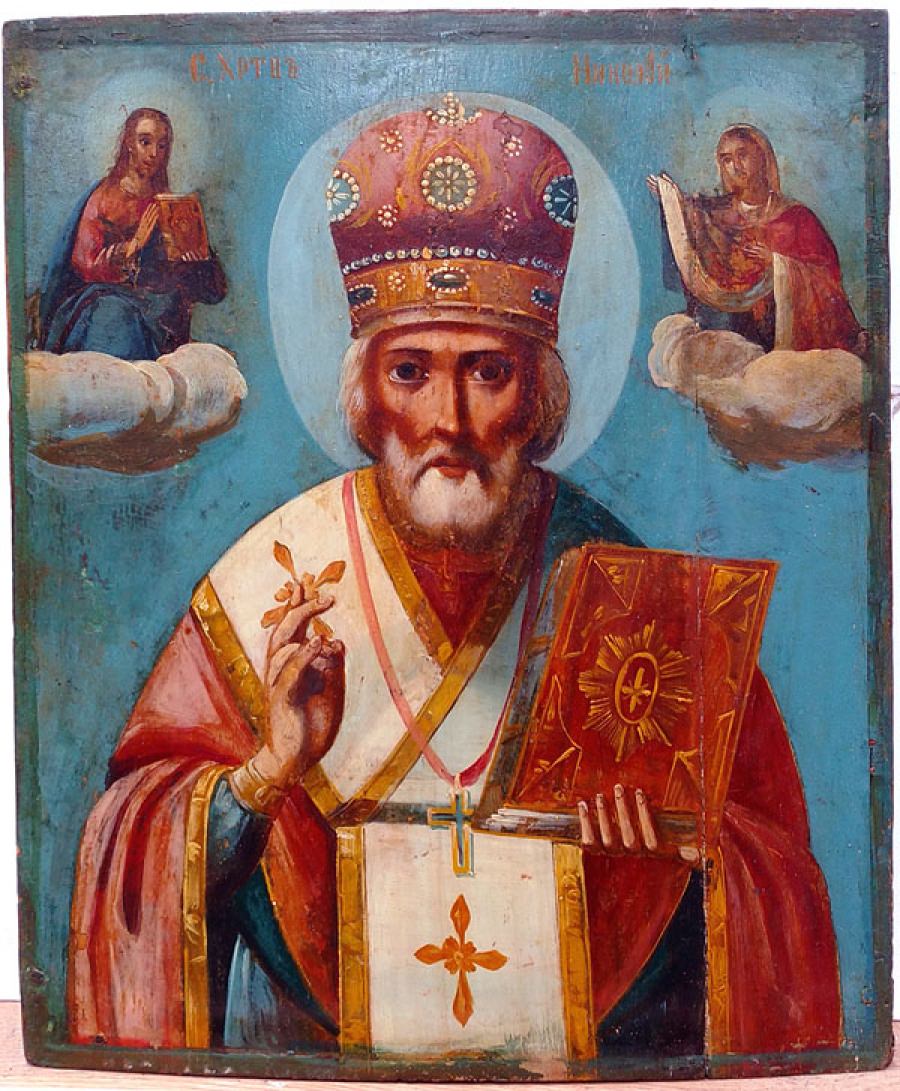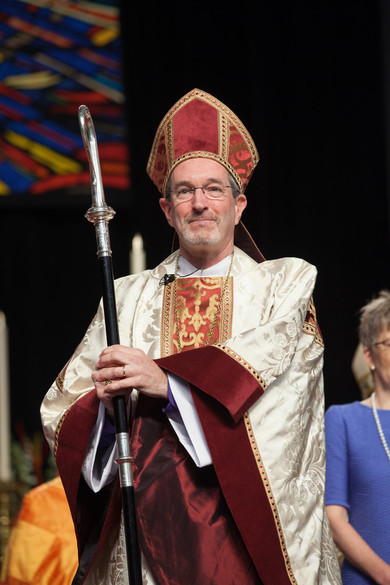Sermon — December 24, 2023
Michael Fenn
If you are like me, primarily a dweller of the city of Boston, there is a normal level of this kind of existential terror that happens when you move to Wyoming. And not just because of the hunting, fishing, cowboys, bears, or the ever-present wind.
I moved to Wyoming to do the Episcopal Service Corps right after I graduated from college. I arrived on the last flight into Cody, Wyoming and the director of my program picked me up in the pitch blackness. I got vague glimpses of the asphalt as we wound through the roads of the Bighorn Basin, going to Walmart because I had forgotten some basic necessities, and then eventually pulling into the house at the retreat center I would live in around 9:30 pm.
Over the course of the next few days I would steal glimpses out of windows, and see the landscape as it passed by as we drove around on various errands around Cody. I remember this feeling of terror, of anxiety, of wonder, and pure awe. For the first time the world was so big, the mountains so grand, the sky so looming, the desert basin so vast, and the glory of God reflected in such a way that I was wholly unaccustomed to. I had a number of conversations with people that confided that they had shared a similar experience upon moving there, it was a landscape that inspired awe and wonder and terror for the unaccustomed.
At some point in October after I had moved I got used to it though, seeing for dozens of miles in every direction became expected, I grew accustomed to distances that were unfathomable to my Massachusetts mind, it became my normal life just like my life in Boston. The views settled in and became commonplace–the background image of my new life. Until they didn’t.
Every so often, I would suddenly see the landscape around my house as if it were the first time–the terror, the awe, the wonder renewed in my sight. I would look at Foretops’s Father (the mountain at the center of the Bighorn Basin) again and my heart would be strangely warmed, I would sit on the top of the hill out back of our house and see Teepee’s Doorway (the valley that leads into Yellowstone) and wipe tears from my eyes. There was no pattern to these moments, nothing that I could do that would definitively make these new moments of wonder unlock for me. Though I did have to make the first motion to actually look, and look again, and to keep looking.
As we approach Advent this year, I am feeling like we have allowed a lot of our most profound and radical stories to settle into the landscapes of our lives. Though, I cannot deny that the familiar stories bring a level of comfort. The birth narratives of Jesus are what many Christian children cut their teeth on when they are being introduced to the faith, and at this time of year we easily settle back into them like a big comfy chair–particularly as Christmas becomes an ungrounding and stressful time. There is a nostalgia and a familiarity to the birth narratives such that they remain stalwart in people’s minds even if they do not remember much else about Christianity.
And this makes sense, there are really cool angels who bring the glory of God to earth and talk to people, Jesus is born in humble (but usually depicted as quite cozy) beginnings, wise men come bearing strange gifts, in some apocryphal traditions a small boy comes to play the drums for the newborn Jesus and his family, and humble shepherds are invited to witness the newborn king. However, I have been attempting. comforting as I find these stories, to put myself out there into the stories again, to look again and again and hope for that same sort of radical transformation.
Today’s story, the Annunciation, feels to me like it has settled into the territory of a bit nice and mystical. Mary just seems to have some cool stuff happen to her, the angel Gabriel comes, and the Annunciation seems to be the mystical stepping stone to the real hoo-rah that we are waiting for, the birth of Christ.
However, if we look and look again, I think what we miss in this story is how brave Mary’s “yes” actually is. In my reading, the bravery of Mary’s action in this story is threefold.
First, this angel greets her in a very strange way, and she is greatly troubled. Here we can note that an unrelated man and woman conversing in public would have been unusual and scary. And also that this man is an angel. Mary is truly greatly troubled to even find herself in this situation.
Second, we can note what exactly the angel is saying to her. In the first bit of what the angel Gabriel is saying to her, the whole thing about kingdoms and her son, is a direct threat to the Roman occupation under which she lives. The region in which Mary lives is a powder keg of a place ready to explode at a moment’s notice. It had only recently come under full Roman occupation and dissent was brewing in major ways. At this tense moment an angel comes and tells her that her son will be the one to upend all of this.
We see this idea most clearly in the Magnificat, one of our most ancient Christian hymns that we sang today. It promises that God will totally cast down the powerful–the kings, the emperor, the governors. It promises that the rich–the landowners, the merchants, the emperor–will be sent away empty-handed. It promises that the proud–the generals, the politicians, the scholars–will be scattered in the imagination of their hearts. All the normativity of the world under which she lives will be destroyed and upended, and she will be an accomplice to this.
Third, Mary is a young, unmarried woman who is told she is going to bear a child. I think there are a lot of apparent dangers here that we can understand. Being any one of these things in Mary’s society comes with a certain amount of danger, to be a young unmarried woman who is bearing a child puts Mary in significant danger. Many modern commentators note that Mary’s subsequent visit to Elizabeth–her cousin who lives kind of far away where nobody knows Mary and she can lay low for a bit–may well have been the result of the danger that she must live through in order to bear the Christ-child.
I hope I have sufficiently highlighted the bravery of Mary’s “yes” in this story, and maybe even shifted your view of this story to how earth-shaking this moment is. For this brief moment the fate of the world hinges on one young woman’s decision to make the brave choice to say yes to bearing the Christ-child. The birth of the Christ-child is predicated on Mary’s heroic choice to step out of what would have been a normal life to step into danger.
The good news is that Mary did say yes. Because of Mary’s bravery our savior in Jesus can join us in our humanity. Because of Mary’s daring decision, Jesus can be incarnated to be our salvation. The world has been profoundly changed because one woman decided that she would make the brave choice and say “yes” to what the Lord called her to do. We only get to revel in the joy of Christmas because of the danger Mary took upon herself, and she did so with great faithfulness and with rejoicing.
So let us rejoice because of Mary’s yes, on account of Mary’s courage, and for the coming of the Christ-child to be with us this Christmas.



